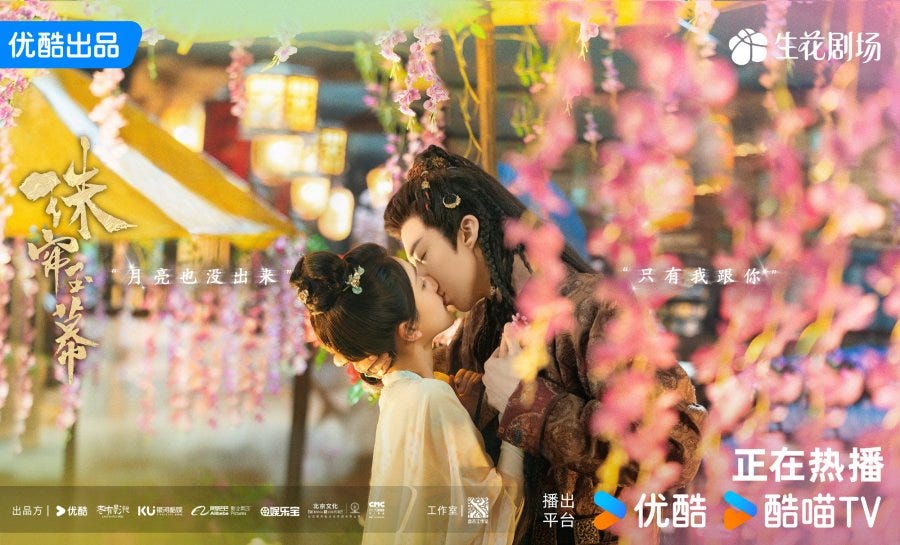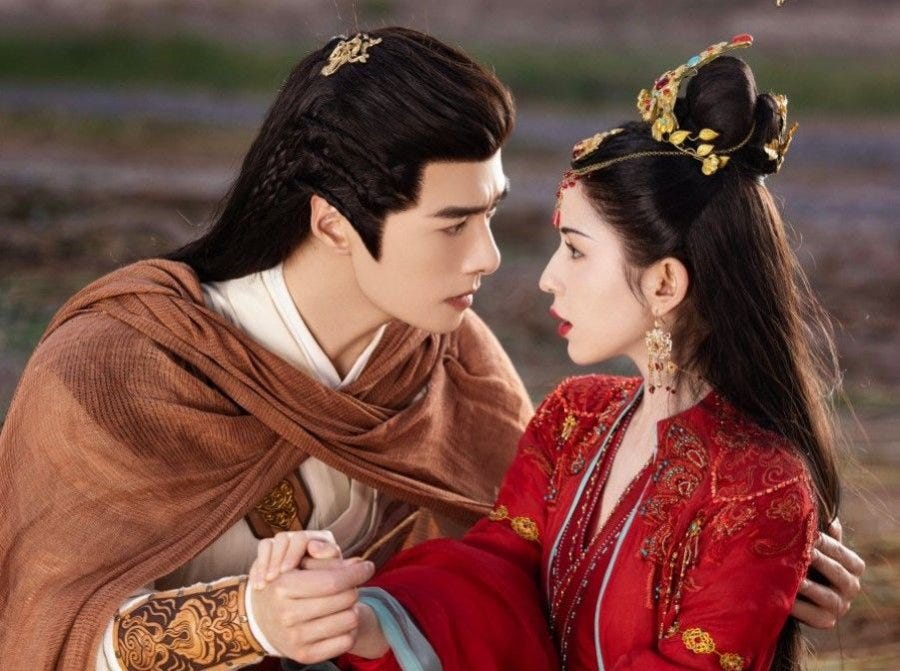My Week in Dramas 12 November 2024
Started The Story of Pearl Girl on the weekend and seven episodes later, I can say that there’s reason to hope that this won’t probably disappoint like others have. While it doesn’t immediately scream greatness, it gets brownie points from me for maintaining its darker tone all throughout these early episodes. Tone, to my mind, speaks to world-building as well. Indeed the script shows promise particularly in how the male leads are positioned in the narrative. The set-up isn’t half-hearted. And the motivations are clearly established quickly. The titular character, Duan Wu (Zhao Lusi) is on some kind of coming-of-age journey and she’s caught in a tug-of-war between two men taking different moral stances or advocating completely worldviews about how life plays out or should do so. In this backdrop the audience is privy to a battle of the tragic pessimist versus the noble optimist. The prize is the heart and mind of Duan Wu, no less. The men quickly establish themselves as her mentors as she seeks to carve out her place in this tumultuous marketplace not only of prized commodities but ideas.
Liu Yuning’s Yan Zijing is the cynical realist merchant, a graduate of the university of hard knocks and Zhang Jinran (Tang Xiaotian) is the gentle poet-scholar who is kindness itself. It’s the perfect set-up for a love triangle — the only kind that makes sense under the circumstances. One is resolute that Duan Wu doesn’t completely lose herself in the mire of a world governed by the rule of “survival of the fittest” and the other keeps her around because he sees something of himself in her. Although it’s not been said out loud, they’re both in love with her for the same reason — the inhuman pluck and the determination to just keep going no matter the odds.
At times it feels like Pirates of the Caribbean rejigged. Yan Zijing is the vengeful seafaring scoundrel with the heart of gold. Of course he is after revenge. Aren’t they all these days? He’s a Bruce Wayne figure who clings to the memory of his father’s murder lest he forget his raison d’être. Duan Wu is the pearl diver who escapes to freedom only to end up in his dragnet because of an heirloom. Having the upperhand Yan Zijing takes it upon himself to show her the ropes — the harsh realities of doing business where evil lurks about in various guises. The tension is great. At times it’s hard to like Yan Zijing. Does he really have to be this brutally realistic? Zhang Jinran has a point (or two) and he’s a lot more likeable at the start. But Yan Zijing is less concerned about Duan Wu’s moral fibre than he is about her survival. She’s no good to anyone dead — least of all, herself.
It’s not for love of the leads that I’m on board although it’s clear that Zhao Lusi has the ability to command better scripts than many of her peers. No doubt her acting gets better as she climbs the dizzy ladder of fame. Liu Yuning’s acting career seems to have taken off since A Journey to Love and there’s no disputing his singing talents which feature here too. This project seems to be demanding the best from both as the characters navigate the high seas and the cut throat environment of the pearling business. For me it’s the premise that’s driving my interest because anyone can make a historical C drama these days — even with an unpolished script riddled with tropes. In times of glut, a good screenplay is far more scarce than an oyster pearl.
Liu Yuning’s colleague in A Journey to Love and The Long Ballad, Fang Yilun aka Alen, can also be seen donning braids in Love in the Desert. I’m not quite done with it but it’s sufficiently entertaining for me to persist even if there are elements that don’t make a whole lot of sense. It doesn’t have the budget of Pearl Girl or A Journey to Love but the actors do their best with what they’ve been served. Which is a very mixed table of dishes. As the title suggests romance is the dominant feature in this landscape of sand dune, inter-tribal politics and bandits. There’s plenty of action that takes its cues from a good old fashion western and then there’s tribal plotting and scheming that alludes to Lawrence of Arabia.
Hankiz Omar is Huang Beishuang, a stunning but destitute princess from Ma Sui is seeking asylum from enemy troops. She barely escapes with her life and encounters Guan Chang from Er Na Qi (a lesser tribe), another princess off to marry the most powerful warlord in that space. The two become friends and decide to switch identities in accordance with their personal goals. Huang Beishuang is looking for some way to restore the fortunes of her people and even revenge on those responsible for the deaths of family members. Along the way to Yunpei to forge a political marriage Beishuang runs into Huo Qingyun (Alen Fang) and the two prettiest people in the show are destined to fall in love despite initial misgivings. Guan Chang, on the other hand, is kidnapped by the notorious desert bandit Ruo Wen who doesn’t do romance that well.
Huo Qingyun does seem like a dubious character at first. He’s certainly not quite what he claims to be although it is demonstrably true that he knows the desert like the back of is hand. There are good reasons for the subterfuge and he plays the knight in shining armour to the damsel in distress to a T. He can’t persuade his lady love not to marry Na Zhan (Ji Lingchen) who is hilariously recruiting wives among the desert tribes to shore up his bid as the man who would unite them all under a single banner. The ladies are not unwilling because of the long-term benefits of sleeping with him. If Ji Lingchen looks vaguely familiar it’s because he made an appearance as Wang Xingyue’s dad in The Double most recently. It’s a small world after all because Na Zhan and Huo Qingyun are somehow connected to each other and they are destined to be rivals in every sense of the word. Na Zhan is keen to get his hands on this multi-volume screed — The Desert Scroll — the holy grail among the desert folk that will presumably consolidate his position as the desert kingpin.
The show has been referred to as a reverse harem by some and it certainly looks like it as Huang Beishuang flits from one man to another out of expediency and necessity. For some reason too her entire destiny is tied to the elusive Desert Scroll which puts her on track for what sounds like a treasure hunt as different chapters of it have been scattered all over the desert. So far so good.
Unfortunately there’s a lot that don’t make sense to me. For instance Huo Qingyun has plenty of opportunities to eliminate his greatest nemesis once he discovers the secret passage to Na Zhan’s manor but he doesn’t. Instead he saunters in and out of the manor to romance Beishuang biding his time. On top of things like that, the final act falls apart at the seams in part because the script tries to force a particular outcome for all the main players. All of this speaks to a systemic plotting issue — a disappointing outcome for a show that starts off well. Perhaps someone is hoping for all the pretty to blindside the audience when normally smart people start doing stupid things “for love”.
Admittedly I’m only watching this for Alen and the romance. I don’t care much about the desert politics here which is mostly a case of kill or be killed. It certainly doesn’t have much of the sophistication of other desert yarns I’ve seen but it’s not why most of sign up for something like this. It’s a light watch with a dark tone. The pacing is generally decent with 26 half-hour episodes on offer. People actually die in this and the director is not shy about skinship and showing skin which will be a crowd pleaser no doubt.
In the vein of things Zhao Lusi, I decided to have a gander at The Romance of Tiger and Rose on my days off last week. I had heard complimentary things about it for a while but never got to it until recently. No doubt it’s meant to be seen as satire and on that level it works (ie. garnering laughs here and there) to the extent it doesn’t take itself too seriously although perhaps unintentionally providing reasons why matriarchal societies don’t ever last. Zhao Lusi is quite good in a comedic role although the character is frustrating to watch. The romance between Qianqian and Han Shuo is sweet although the drama is decidedly too long so the push and pull goes on for what feels like forever. The rationale being that Qianqian is driven to undo her “mistakes” as the transmigrated author of the original script. The truth, as she gradually realises, is that often what’s done can never be undone.
As someone who has dabbled in fiction I can attest to the fact that a story can take on a life of its own. Characters can also lead the writer to unexpected places because choices have consequences on the plot and themes. In a show like this where the writing process is being parodied, it’s inevitable that questions about playing God comes up. Unlike God, human beings are finite and certainly not omniscient. Good intentions alone cannot guarantee the “right” result — whatever that means and for whom that might be applicable to. So it should come as no surprise that my favourite part of the show is when Qianqian has these story meetings with the most prominent storytellers of the city making do with items from the fruit bowl on the table.
At the end of the day it is a high school romance with historical garb. Ding Yuxi who is Zhao Lusi’s male lead is better than I expected. In many ways his character Han Shuo is the “aloof bad boy” in the high school romance. His primary adversary for Qianqian’s affections is Pei Heng who is constructed as the “good boy”. It’s the usual thing where the so-called bad boy who portends danger turns out to be the one who bends over backwards for the girl at the centre of the story. Qianqian doesn’t want to be at the centre but it’s a lost cause the moment she inhabits the body of her host because her first instinct is to survive. That fight or flight impulse changes the entire course of the story once she has skin in the game.
The show is fun when it’s not trying to prolong the push and pull. These storylines are well used in C dramas so it’s all tropey fluff for the most part. More and more I’m convinced that tropey shows should be shorter than what they usually are because we all know what’s coming down the pike anyway.
If you find this helpful please like, share or leave comment. As always thank you for your ongoing support.




